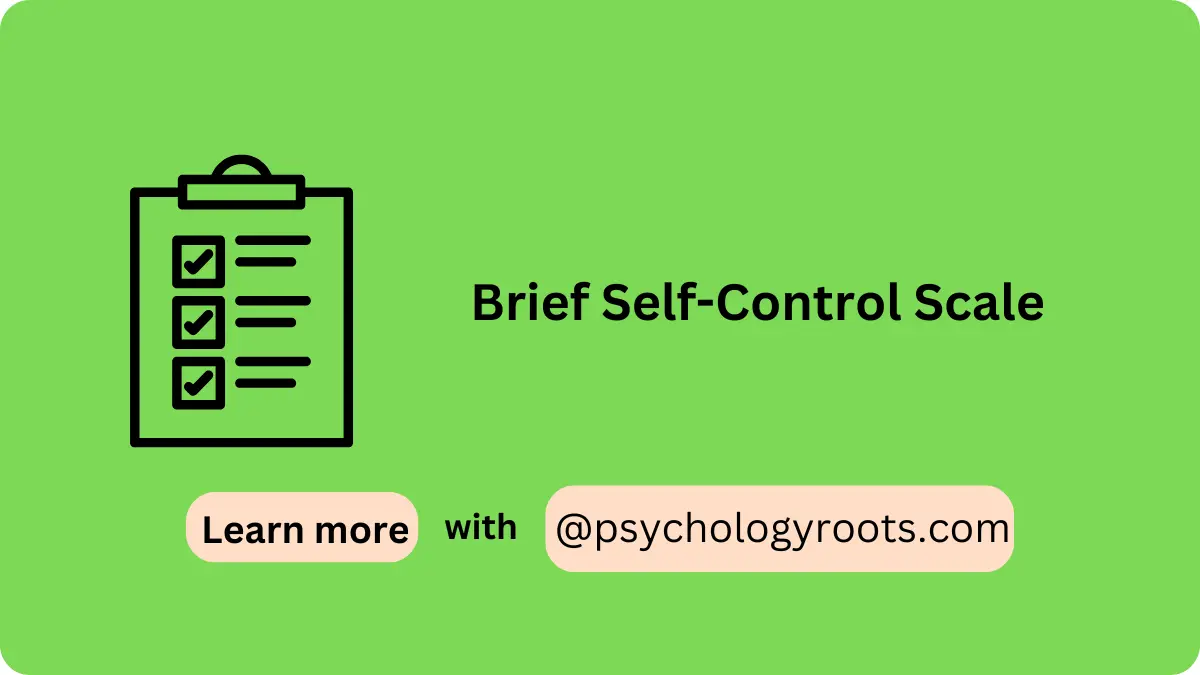Table of Contents
Brief Self-Control Scale
Here in this post, we are sharing the “Brief Self-Control Scale”. You can read psychometric and Author information. We have thousands of Scales and questionnaires in our collection (See Scales and Questionnaires). You can demand us any scale and questionnaires related to psychology through our community, and we will provide you with a short time. Keep visiting Psychology Roots.
About Brief Self-Control Scale
Scale Name
Brief Self-Control Scale
Author Details
June P. Tangney, Roy F. Baumeister, and Angie L. Boone
Translation Availability
English

Background/Description
The Brief Self-Control Scale (BSCS) is a 13-item self-report instrument developed to assess individual differences in self-control, the capacity to regulate thoughts, emotions, and behaviors in alignment with long-term goals. Self-control is a pivotal construct in psychology, linked to various positive outcomes such as better adjustment, academic success, and interpersonal effectiveness. The BSCS evaluates facets like impulse control, goal setting, and habit breaking, providing a comprehensive measure of an individual’s self-regulatory abilities. Its brevity and robust psychometric properties make it a valuable tool in both research and applied settings.
Administration, Scoring and Interpretation
- Obtain a Copy: Acquire the BSCS from authorized academic publications or psychological assessment resources.
- Explain the Purpose: Inform participants that the BSCS measures their typical self-control behaviors and is used for research or clinical purposes to understand self-regulation.
- Provide Instructions: Instruct participants to respond to each statement based on how much it reflects their typical behavior, using a Likert scale ranging from 1 (not at all like me) to 5 (very much like me).
- Approximate Time: Inform participants that the BSCS requires about 5–10 minutes to complete.
- Administer the Scale: Distribute the questionnaire in a quiet environment, ensuring participants can complete it without interruptions.
Reliability and Validity
The BSCS demonstrates high internal consistency, with Cronbach’s alpha coefficients typically above 0.80, indicating reliable measurement of the self-control construct. Its validity is supported by significant correlations with various positive life outcomes, including academic performance, psychological adjustment, and interpersonal functioning. However, some studies have explored its factor structure, suggesting both unidimensional and multidimensional models, which indicates ongoing discussions regarding its dimensionality.
Available Versions
13-Items
Reference
Manapat, P. D., Edwards, M. C., MacKinnon, D. P., Poldrack, R. A., & Marsch, L. A. (2021). A Psychometric Analysis of the Brief Self-Control Scale. Assessment, 28(2), 395–412. https://doi.org/10.1177/1073191119890021
Tangney, J. P., Baumeister, R. F., & Boone, A. L. (2004). High self-control predicts good adjustment, less pathology, better grades, and interpersonal success. Journal of Personality, 72(2), 271–324. https://doi.org/10.1111/j.0022-3506.2004.00263.x
Important Link
Scale File:
Frequently Asked Questions
What is the Brief Self-Control Scale (BSCS)?
The BSCS is a 13-item self-report questionnaire designed to assess individual differences in self-control.
Who developed the BSCS?
The scale was developed by June P. Tangney, Roy F. Baumeister, and Angie L. Boone in 2004.
How is the BSCS scored?
Participants rate each item on a 5-point Likert scale; higher total scores indicate greater self-control.
What outcomes are associated with high scores on the BSCS?
High self-control scores are linked to better psychological adjustment, academic performance, and interpersonal success.
Disclaimer
Please note that Psychology Roots does not have the right to grant permission for the use of any psychological scales or assessments listed on its website. To use any scale or assessment, you must obtain permission directly from the author or translator of the tool. Psychology Roots provides information about various tools and their administration procedures, but it is your responsibility to obtain proper permissions before using any scale or assessment. If you need further information about an author’s contact details, please submit a query to the Psychology Roots team.
Help Us Improve This Article
Have you discovered an inaccuracy? We put out great effort to give accurate and scientifically trustworthy information to our readers. Please notify us if you discover any typographical or grammatical errors.
Make a comment. We acknowledge and appreciate your efforts.
Share With Us
If you have any scale or any material related to psychology kindly share it with us at psychologyroots@gmail.com. We help others on behalf of you.